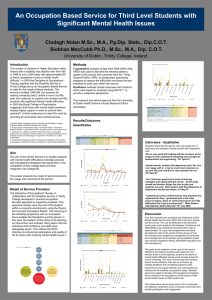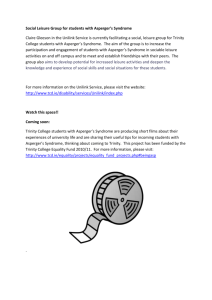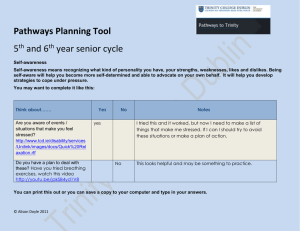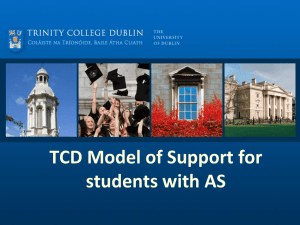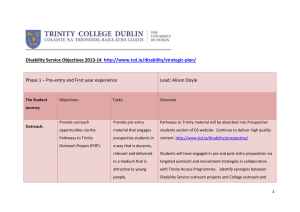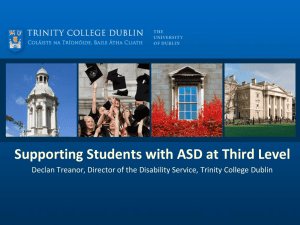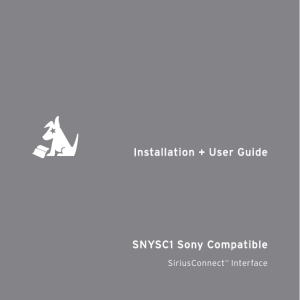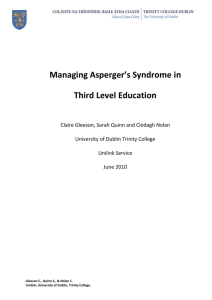Asperger’s Syndrome in the Unilink Service, Trinity College:
advertisement
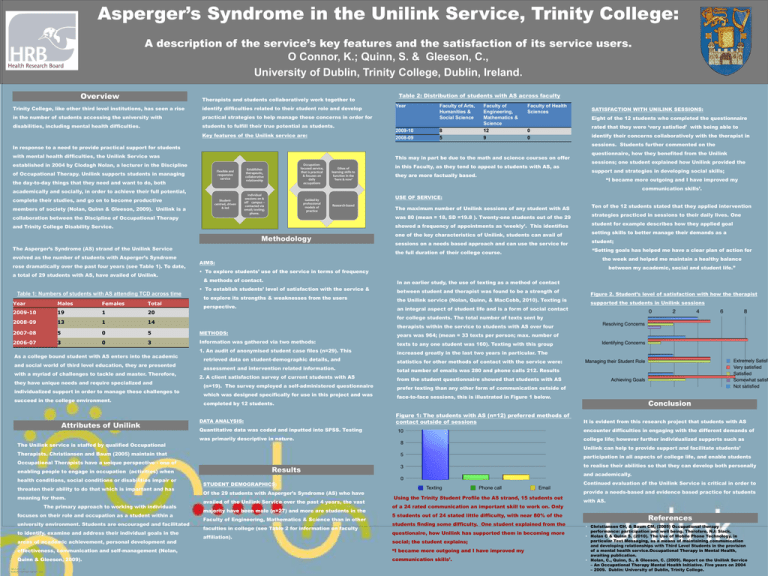
Asperger’s Syndrome in the Unilink Service, Trinity College: A description of the service’s key features and the satisfaction of its service users. O Connor, K.; Quinn, S. & Gleeson, C., University of Dublin, Trinity College, Dublin, Ireland. OPTIONAL LOGO HERE Overview Therapists and students collaboratively work together to Trinity College, like other third level institutions, has seen a rise identify difficulties related to their student role and develop in the number of students accessing the university with practical strategies to help manage these concerns in order for disabilities, including mental health difficulties. students to fulfill their true potential as students. Key features of the Unilink service are: Table 2: Distribution of students with AS across faculty Year 2009-10 2008-09 Faculty of Arts, Humanities & Social Science 8 5 Faculty of Engineering, Mathematics & Science 12 9 Faculty of Health Sciences SATISFACTION WITH UNILINK SESSIONS: Eight of the 12 students who completed the questionnaire 0 0 rated that they were ‘very satisfied’ with being able to identify their concerns collaboratively with the therapist in sessions. Students further commented on the In response to a need to provide practical support for students with mental health difficulties, the Unilink Service was This may in part be due to the math and science courses on offer established in 2004 by Clodagh Nolan, a lecturer in the Discipline in this Faculty, as they tend to appeal to students with AS, as of Occupational Therapy. Unilink supports students in managing they are more factually based. questionnaire, how they benefited from the Unilink sessions; one student explained how Unilink provided the support and strategies in developing social skills; “I became more outgoing and I have improved my the day-to-day things that they need and want to do, both communication skills’. academically and socially, in order to achieve their full potential, USE OF SERVICE: complete their studies, and go on to become productive members of society (Nolan, Quinn & Gleeson, 2009). Unilink is a The maximum number of Unilink sessions of any student with AS Ten of the 12 students stated that they applied intervention collaboration between the Discipline of Occupational Therapy was 80 (mean = 18, SD =19.8 ). Twenty-one students out of the 29 strategies practiced in sessions to their daily lives. One and Trinity College Disability Service. showed a frequency of appointments as ‘weekly’. This identifies student for example describes how they applied goal one of the key characteristics of Unilink, students can avail of setting skills to better manage their demands as a sessions on a needs based approach and can use the service for student; the full duration of their college course. “Setting goals has helped me have a clear plan of action for Methodology The Asperger’s Syndrome (AS) strand of the Unilink Service evolved as the number of students with Asperger’s Syndrome rose dramatically over the past four years (see Table 1). To date, a total of 29 students with AS, have availed of Unilink. Table 1: Numbers of students with AS attending TCD across time the week and helped me maintain a healthy balance AIMS: between my academic, social and student life.” • To explore students’ use of the service in terms of frequency & methods of contact. In an earlier study, the use of texting as a method of contact • To establish students’ level of satisfaction with the service & between student and therapist was found to be a strength of to explore its strengths & weaknesses from the users the Unilink service (Nolan, Quinn, & MacCobb, 2010). Texting is perspective. an integral aspect of student life and is a form of social contact Year Males Females Total 2009-10 19 1 20 2008-09 13 1 14 2007-08 5 0 5 METHODS: years was 964; (mean = 33 texts per person; max. number of 2006-07 3 0 3 Information was gathered via two methods: texts to any one student was 160). Texting with this group 1. An audit of anonymised student case files (n=29). This increased greatly in the last two years in particular. The As a college bound student with AS enters into the academic and social world of third level education, they are presented with a myriad of challenges to tackle and master. Therefore, they have unique needs and require specialized and individualized support in order to manage these challenges to succeed in the college environment. Attributes of Unilink The Unilink service is staffed by qualified Occupational therapists within the service to students with AS over four retrieved data on student-demographic details, and statistics for other methods of contact with the service were: assessment and intervention related information. total number of emails was 280 and phone calls 212. Results 2. A client satisfaction survey of current students with AS from the student questionnaire showed that students with AS (n=19). The survey employed a self-administered questionnaire prefer texting than any other form of communication outside of which was designed specifically for use in this project and was face-to-face sessions, this is illustrated in Figure 1 below. Figure 1: The students with AS (n=12) preferred methods of contact outside of sessions DATA ANALYSIS: The primary approach to working with individuals focuses on their role and occupation as a student within a university environment. Students are encouraged and facilitated to identify, examine and address their individual goals in the areas of academic achievement, personal development and encounter difficulties in engaging with the different demands of was primarily descriptive in nature. college life; however further individualized supports such as Unilink can help to provide support and facilitate students’ participation in all aspects of college life, and enable students to realise their abilities so that they can develop both personally Results and academically. STUDENT DEMOGRAPHICS: Continued evaluation of the Unilink Service is critical in order to Of the 29 students with Asperger’s Syndrome (AS) who have provide a needs-based and evidence based practice for students availed of the Unilink Service over the past 4 years, the vast majority have been male (n=27) and more are students in the Faculty of Engineering, Mathematics & Science than in other faculties in college (see Table 2 for information on faculty affiliation). Using the Trinity Student Profile the AS strand, 15 students out of a 24 rated communication an important skill to work on. Only 5 students out of 24 stated little difficulty, with near 80% of the students finding some difficulty. One student explained from the questionaire, how Unilink has supported them in becoming more social; the student explains; effectiveness, communication and self-management (Nolan, “I became more outgoing and I have improved my Quinn & Gleeson, 2009). communication skills’. TEMPLATE DESIGN © 2008 www.PosterPresentations.com It is evident from this research project that students with AS Quantitative data was coded and inputted into SPSS. Testing enabling people to engage in occupation (activities) when meaning for them. Conclusion completed by 12 students. Occupational Therapists have a unique perspective - one of threaten their ability to do that which is important and has supported the students in Unilink sessions for college students. The total number of texts sent by Therapists. Christiansen and Baum (2005) maintain that health conditions, social conditions or disabilities impair or Figure 2. Student’s level of satisfaction with how the therapist with AS. References • Christiansen CH, & Baum CM, (2005) Occupational therapy performance: participation and well being. Thorofare, NJ: Slack. • Nolan C & Quinn S. (2010). The Use of Mobile Phone Technology, in particular Text Messaging, as a means of maintaining communication and developing relationships with Third Level Students in the provision of a mental health service.Occupational Therapy in Mental Health, awaiting publication. • Nolan, C., Quinn, S., & Gleeson, C. (2009). Report on the Unilink Service – An Occupational Therapy Mental Health Initiative. Five years on 2004 – 2009. Dublin: University of Dublin, Trinity College.
